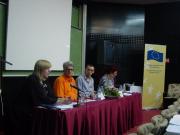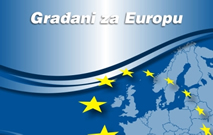Holding of the Conference “The media in the process of sustainable return and reintegration”
 The media in the process of sustainable return and reintegration was the
topic of the Conference held in Tuzla on June 18th, 2008. The
Conference was the result of years-long attempts of Association Vesta to
instill the necessary level of sensitization into the local media which is
typical of the global non-profit media, which respond to the community's needs
and promote its progress.
The media in the process of sustainable return and reintegration was the
topic of the Conference held in Tuzla on June 18th, 2008. The
Conference was the result of years-long attempts of Association Vesta to
instill the necessary level of sensitization into the local media which is
typical of the global non-profit media, which respond to the community's needs
and promote its progress.
The purpose of the Conference was to draw the public's attention to the effect of the media in the process of reintegration and the need for fair and objective reporting which is independent of ethnic divisions and does not promote xenophobia, discrimination and nationalism.
The Conference "The Media in the process of sustainable return and reintegration" provided answers to several questions from particular segments concerning the cooperation between the media and non-governmental organizations in the return zones, the effect of the media on safety, their role in the implementation of the Law on Free Access to Information during the reintegration process, and the responsibility of the media to combat discrimination and xenophobia.
The Conference consisted of three panel discussions with 10 presentations of panelists:
Panel discussion I: The role of the media in reducing the effect of xenophobic elements and discrimination on the public
- 1. Borka Rudić, Association of BH. Journalists
- 2. Sinan Alić, Foundation Truth, Justice, Reconciliation
- 3. Branko Todorović, the Helsinki Committee for Human Rights of Republika Srpska
Panel discussion II: Professionalization of the media for the purpose of stabilization and security in Bosnia and Herzegovina
- 1. Dunja Mijatović, the Regulatory Agency for Communication of B&H
- 2. Najil Kurtić, PhD, professor at the University of Tuzla
- 3. Branka Inić, the Helsinki Committee for Human Rights of B&H
Panel discussion III: Media access to official data - The Law on Free Access to Information, the governmental and non-governmental organizations, human rights and the media
- 1. Amira Krehić, the Centre for Free Access to Information
- 2. Ševka Palo, the Ministry of Refugees and Displaced Persons of the Federation of B&H
- 3. Rade Zorić, the Ministry of Refugees and Displaced Persons of Republika Srpska
- 4. Mirhunisa Zukić, Union of Associations of Refugees and Displaced Persons of B&H
Some conclusions from the Conference:
The media agenda does not adequately reflect the intensity and the nature of returnee problems
Returnee issues are placed on the margins of daily topicalities
The media have the function of realizing geo-strategic goals of the holders of the main conceptions of reality in Bosnia and Herzegovina
The society is tired of returnee topics, it has lost interest in them, and the media, following the marketing interests, only cover the trends in the public agenda
The media cause the national and ideological sub-communities to close even further, and postpone the consensus on the happy ending of the returnee story
Radio and TV shows are conceived with the purpose of homogenization and the psychological empowerment of their sympathizers, which in practice means that their own practice is praised and embellished, while everything that is different is denigrated
The mass media are an indispensable factor in any organized activity of the governmental and non-governmental institutions on finalizing the socially and economically sustainable return to Bosnia and Herzegovina
The Conference also produced some recommendations:
The key precondition is that the holders of different conceptions of the future of Bosnia and Herzegovina stop interpreting the returnee issue from the geo-strategic perspective and take a perspective of universal rights and freedoms
We can expect that the non-governmental sector will establish a global communication community, which will include the socially-responsible media and in which the issues such as return will be discussed freely
It is necessary that the non-governmental sector exert uncompromising pressure on the state to depoliticize the returnee issue
The media must accept their part of the responsibility for finalizing the returnee story - understanding and interpreting it as the final stage of ending the war in the area of Bosnia and Herzegovina, and not as its continuation
The media must recover control over their original functions, which means assuming their part of the social responsibility for the public discourse agenda and the main trends of public opinion
The Conference was attended by representatives of the media, civil society organizations and returnee associations, representatives of municipalities in Northeastern Bosnia and Herzegovina, representatives from the Ministry for Refugees and Displaced Persons of the Federation of B&H and representatives from the Ministry for Refugees and Displaced Persons of Republika Srpska.
The conclusions and recommendations from the Conference will be sent on to all the relevant institutions and interested parties for the purpose of developing unique media space, which would serve the needs of the citizens.
The Conference is a logical follow-up to the previous activities undertaken by Association Vesta in returnee communities in Northeastern Bosnia and Herzegovina. The need for dialogue on the role of the media became evident during the realization of previous projects, which enabled citizens to actively participate in the decision-making process at the local level and to reintegrate successfully into the community. The multi-discipline nature of Vesta's activities has ensured active communication and sustainable cooperation between the public administration, local communities of minority returnees and the media. In the same manner, this Conference invites all those familiar with the situation in Bosnia and Herzegovina to share their views and potentially contribute to the regeneration of the media space in the country.


